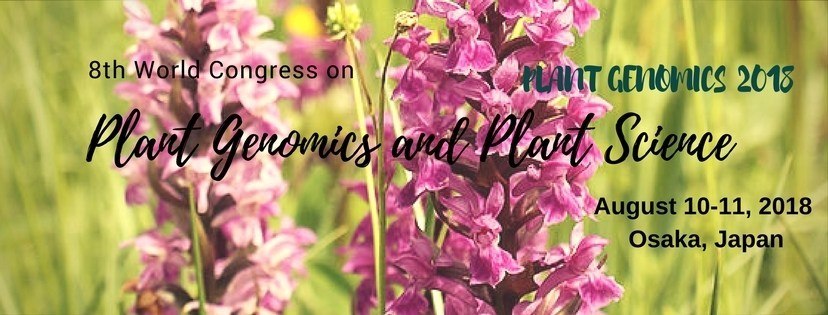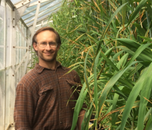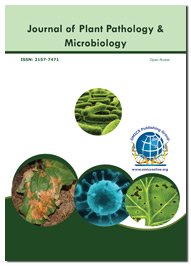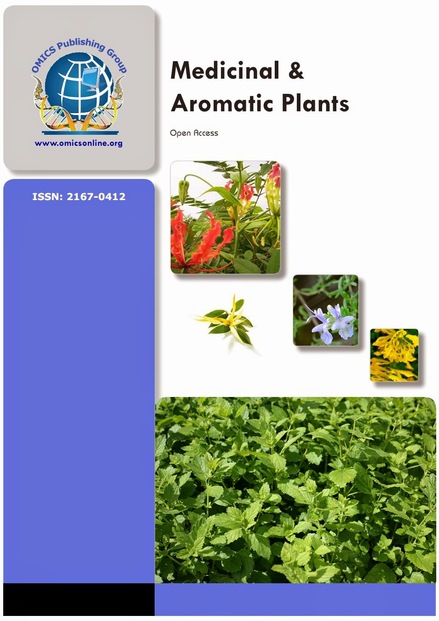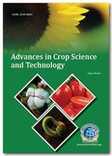Theme: Exploring the Current Frontiers in plant Genomics & Plant Science
Plant Genomics 2018


Dear Colleagues,
Being an Organizing Committee member, it is my great honor and pleasure to invite you to participate in the 8th World Congress on Plant Genomics and Plant Science to be held in Osaka, Japan, on August 10-11, 2018.
PLANT GENOMICS 2018 brings together domain experts, researchers, clinicians, industry representatives, postdoctoral fellows, and students from around the world, providing them with the opportunity to report, share, and discuss scientific questions, achievements, and challenges in this field.
One of our aim is to generate new investigations and collaboration between scientists. We also are very interested to welcome students and postdoctoral researchers to provide them the opportunity to show their investigations about Plant Genomics 2018.
We hope that this conference will be productive and satisfying. Personally, I hope that you have a very enjoyable and entertaining stay here, in Osaka, Japan.

Associate Research Specialist,
Academia Sinica, Agricultural Biotechnology Research Center, Taiwan
Conference Series LLC LTD invites all the participants from all over the world to attend 8th World Congress on Plant Genomics during August 10-11, 2018 Osaka, Japan which includes prompt keynote presentations, Oral talks, Poster presentations and Exhibitions.
Plant Genomics 2018 is the premier event that brings together a unique and international mix of experts, researchers and decision makers both from academia and industry across the globe to exchange their knowledge, expertise and research innovations to build a world class plant genomics conference.
It’s our greatest pleasure to welcome you to the official website of ‘8th World Congress on Plant Genomics that aims at bringing together the Professors, Researchers, scientists, Program developers to provide an international forum for the dissemination of original research results, new ideas and practical development experiences which concentrate on both theory and practices. The conference will be held in August 10-11, 2018 Osaka, Japan. The theme of the conference is around, “Exploring the Current Frontiers in Plant Genomics & Plant Science”. Featuring 2days of scientific workshop, special sessions, speaker & poster session, Industrial Expo. 300+ attendees from all over the world.
The event focuses on aspects such as breeding, molecular marker development, crop/ trait improvement, disease resistance, epigenetics, evolution studies and pathology as well understanding tools to overcome barrier and enable successful data analysis and management. Presentations concentrate not only particular to plant genomics but also crop and forestry research ranging from wheat, barley, maize and rice to potato, tomato, Arabidopsis, biofuels and various fruits. Conference Series LLC LTD organizes a conference series of 1000+ Global Events inclusive of 300+ Conferences, 500+ Upcoming and Previous Symposiums and Workshops in USA, Europe & Asia with support from 1000 more scientific societies and publishes 700+ Open access journals which contains over 30000 eminent personalities, reputed scientists as editorial board members.
Why to attend???
With members from around the world focused on learning about Plant Genomics and its advances; this is your best opportunity to reach the largest assemblage of participants from the Plant Science and Genomics community. Conduct presentations, distribute information, meet with current and potential scientists, make a splash with new advancements and developments, and receive name recognition at this 2-day event. World-renowned speakers, the most recent techniques, developments, and the newest updates in Plant Genomics are hallmarks of this conference.
Target Audience:
- Plant Genomics Students, Scientists
- Plant Genomics Researchers
- Plant Genomics Faculty
- Agricultural Colleges
- Plant and Agriculture Associations and Societies
- Business Entrepreneurs
- Training Institutes
- Software developing companies
- Manufacturing Agricultural Devices Companies
Track 1: Plant Genomics
Plant Genomics is the part of molecular biology working with the structure, function, evolution, and mapping of genomes in plants. Genomics is the study of genes, their expression and their activities, the role played in biology. Genomics is a branch of genetics that is concerned with the sequencing and analysis of organism's genome. Genomics aids us in maintaining the large number of database that assists us to study genetic variation.
Related Conferences
3rd Global Summit on Plant Science August 07-09, 2017 Rome, Italy; 3rd International Conference on Food and Beverage Packaging August 29-30, 2017 London, UK; 18th Global Summit on Food & Beverages October 02-04, 2017 Chicago, Illinois, USA; 9th World Congress on Aquaculture & Fisheries October 23-24, 2017 Dubai, UAE; 11th Global Summit on Aquaculture & Fisheries May 24-25, 2018 Osaka, Japan; 20th World Congress on Nutrition, Food Science & Public HealthMay 14-16, 2018 Tokyo, Japan; 3rd International Conference on Plant Science & Physiology May 21-22, 2018 Osaka, Japan; Global Conference on Plant Science and Molecular Biology 11–13 September 2017 valencia, Spain; American Society of Plant Biologists (ASPB), Australian Society of Plant Scientists (ASPS), Argentinean Society of Plant Physiology (SAFV), American Society of Agronomy (ASA), African Crop Science Society (ACSS), Brazilian Society of Plant Physiology (SBFV), Botanical Society of China (BSC), Canadian Society of Plant Biologists (CSPB), Chile’s National Network of Plant Biologists (CNNPB),
Track 2: Agricultural Science
Agricultural Science is a broad multidisciplinary field of sciences that consists of the parts of precise, natural, and social sciences that are utilized in the practice and understanding of agriculture. Agronomy is research and development related to studying and improving plant-based crops.
Related Conferences
18th Global Summit on Food & Beverages October 02-04, 2017 Chicago, Illinois, USA; 9th World Congress on Aquaculture & Fisheries October 23-24, 2017 Dubai, UAE; 11th Global Summit on Aquaculture & Fisheries May 24-25, 2018 Osaka, Japan; 20th World Congress on Nutrition, Food Science & Public HealthMay 14-16, 2018 Tokyo, Japan; 3rd International Conference on Plant Science & Physiology May 21-22, 2018 Osaka, Japan; Global Conference on Plant Science and Molecular Biology 11–13 September 2017 valencia, Spain; American Society of Plant Biologists (ASPB), Australian Society of Plant Scientists (ASPS), Argentinean Society of Plant Physiology (SAFV), American Society of Agronomy (ASA), African Crop Science Society (ACSS), Brazilian Society of Plant Physiology (SBFV), Botanical Society of China (BSC), Canadian Society of Plant Biologists (CSPB), Chile’s National Network of Plant Biologists (CNNPB), Chinese Society of Plant Biology (CSPB), Crop Science Society of America (CSSA), Crop Science Society of China (CSSC) , European Association for Research on Plant Breeding (EUCARPIA),
Track 3: Plant Proteomics
Plant Proteomics is concerned with the entire complement of proteins of plants including the modifications made to a particular set of proteins. Proteomics is an in depth study of a specific proteome, including information on protein and its modifications and variations. Proteomics works with the interacting partners and members associated with it in a sequential network.
Related Conferences
3rd Global Summit on Plant Science August 07-09, 2017 Rome, Italy; 3rd International Conference on Food and Beverage Packaging August 29-30, 2017 London, UK; 18th Global Summit on Food & Beverages October 02-04, 2017 Chicago, Illinois, USA; 9th World Congress on Aquaculture & Fisheries October 23-24, 2017 Dubai, UAE; 11th Global Summit on Aquaculture & Fisheries May 24-25, 2018 Osaka, Japan; 20th World Congress on Nutrition, Food Science & Public HealthMay 14-16, 2018 Tokyo, Japan; 3rd International Conference on Plant Science & Physiology May 21-22, 2018 Osaka, Japan; Global Conference on Plant Science and Molecular Biology 11–13 September 2017 valencia, Spain; American Society of Plant Biologists (ASPB), Australian Society of Plant Scientists (ASPS), Argentinean Society of Plant Physiology (SAFV), American Society of Agronomy (ASA), African Crop Science Society (ACSS),
Track 4: Plant Genetics
Plant Genetics is a wide spectrum term. There are multiple types of genetics in general. The concept of genetics is the branch of biology that deals with heredity, especially the mechanisms of hereditary transmission and the variation of inherited characteristics among similar or related organisms. Plant genetics deals with the associated activities of the plant that effect the day to day life processes of the plant.
Related Conferences
20th World Congress on Nutrition, Food Science & Public HealthMay 14-16, 2018 Tokyo 11th Global Summit on Aquaculture & Fisheries May 24-25, 2018 Osaka, Japan; 14-16, 2018 Tokyo, Japan; 3rd International Conference on Plant Science & Physiology May 21-22, 2018 Osaka, Japan; Global Conference on Plant Science and Molecular Biology11–13 September 2017 valencia, Spain; American Society of Plant Biologists (ASPB), Australian Society of Plant Scientists (ASPS), Argentinean Society of Plant Physiology (SAFV), American Society of Agronomy (ASA), African Crop Science Society (ACSS), Brazilian Society of Plant Physiology (SBFV), Botanical Society of China (BSC), Canadian Society of Plant Biologists (CSPB), Chile’s National Network of Plant Biologists (CNNPB), Chinese Society of Plant Biology (CSPB), Crop Science Society of America (CSSA),
Track 5: Plant Science
Plant Sciences is the study of plant growth, reproduction, evolution, and adaptation, as well as the use of plants for food, fiber, and ornamental purposes. While students majoring in Plant Sciences necessarily share a common enthusiasm for plants, the variety of available courses and research opportunities encourages a great diversity of individual interests and career paths. Plant Sciences students gain the expertise necessary to advance research in and address many local, regional, and global challenges.
Related Conferences
11th Global Summit on Aquaculture & Fisheries May 24-25, 2018 Osaka, Japan; 20th World Congress on Nutrition, Food Science & Public HealthMay 14-16, 2018 Tokyo, Japan; 3rd International Conference on Plant Science & Physiology May 21-22, 2018 Osaka, Japan; Global Conference on Plant Science and Molecular Biology 11–13 September 2017 valencia, Spain; 18th Global Summit on Food & Beverages October 02-04, 2017 Chicago, Illinois, USA; 9th World Congress on Aquaculture & Fisheries October 23-24, 2017 Dubai, UAE; 11th Global Summit on Aquaculture & Fisheries May 24-25, 2018 Osaka, JapanEuropean Plant Science Organisation (EPSO), Federation of European Societies of Plant Biology (FESPB), Genetics Society of China (GSC), International Society of Plant Pathology (ISPP), Indian Society of Plant Physiology (ISPP), International Crop Science Society (ICSS), International Society for Horticultural Science (ISHS), Irish Plant Scientists' Association (IPSA), International Society for Plant Molecular Biology (ISPMB)
Track 6: Horticulture Sciences
Horticulture Sciences is the branch of agriculture that deals with the art, science, technology, and business of vegetable garden plant growing. Horticulture is the science and art of producing, improving, marketing, and using fruits, vegetables, flowers, and ornamental plants. It differs from botany and other plant sciences in that horticulture incorporates both science and aesthetics.
Related Conferences
3rd International Conference on Plant Science & Physiology May 21-22, 2018 Osaka, Japan; Global Conference on Plant Science and Molecular Biology 11–13 September 2017 valencia, Spain; 11th Global Summit on Aquaculture & Fisheries May 24-25, 2018 Osaka, Japan; 20th World Congress on Nutrition, Food Science & Public HealthMay 14-16, 2018 Tokyo, Japan; 3rd International Conference on Plant Science & Physiology May 21-22, 2018 Osaka, Japan; Global Conference on Plant Science and Molecular Biology 11–13 September 2017 valencia, Spain; American Society of Plant Biologists (ASPB), Australian Society of Plant Scientists (ASPS), Argentinean Society of Plant Physiology (SAFV), American Society of Agronomy (ASA), African Crop Science Society (ACSS), Brazilian Society of Plant Physiology (SBFV), Botanical Society of China (BSC), Canadian Society of Plant Biologists (CSPB), Chile’s National Network of Plant Biologists (CNNPB), Chinese Society of Plant Biology (CSPB), Crop Science Society of America (CSSA), Crop Science Society of China (CSSC) , European Association for Research on Plant Breeding (EUCARPIA),
Track 7 : Botanical Science
Botany is the science of plant life and a branch of biology that deals with the study of plants. Plants are a wide range of living organisms from the tiniest organisms to the mammoth living organisms. In general terms plants include algae, fungi, lichens, mosses, ferns, conifers and flowering plants. Botany is the scientific discipline that works on observation, experimentation, recording, classification, and the testing of hypotheses, in a methodological manner.
Related Conferences
9th World Congress on Aquaculture & Fisheries October 23-24, 2017 Dubai, UAE; 11th Global Summit on Aquaculture & Fisheries May 24-25, 2018 Osaka, Japan; 20th World Congress on Nutrition, Food Science & Public HealthMay 14-16, 2018 Tokyo, Japan; 3rd International Conference on Plant Science & Physiology May 21-22, 2018 Osaka, Japan; Global Conference on Plant Science and Molecular Biology 11–13 September 2017 valencia, Spain; American Society of Plant Biologists (ASPB), Australian Society of Plant Scientists (ASPS), Argentinean Society of Plant Physiology (SAFV), American Society of Agronomy (ASA), African Crop Science Society (ACSS), Brazilian Society of Plant Physiology (SBFV), Botanical Society of China (BSC), Canadian Society of Plant Biologists (CSPB), Chile’s National Network of Plant Biologists (CNNPB), Chinese Society of Plant Biology (CSPB), Crop Science Society of America (CSSA), Crop Science Society of China (CSSC) , European Association for Research on Plant Breeding (EUCARPIA),
Track 8: Plant signaling
Plant signaling is the ability of plants to sense and respond to the environment to adjust their morphology, physiology and phenotype accordingly. Other subdivisions such as plant physiology, ecology and molecular biologyare utilized to analyze the abilities of the plant. Plants react to chemicals, gravity, light, moisture, infections, temperature, oxygen and carbon dioxide concentrations, parasite infestation, disease, physical disruption, sound and touch.
Related Conferences
11th Global Summit on Aquaculture & Fisheries May 24-25, 2018 Osaka, Japan; 20th World Congress on Nutrition, Food Science & Public HealthMay 14-16, 2018 Tokyo, Japan; 3rd International Conference on Plant Science & Physiology May 21-22, 2018 Osaka, Japan; Global Conference on Plant Science and Molecular Biology 11–13 September 2017 valencia, Spain; American Society of Plant Biologists (ASPB), Australian Society of Plant Scientists (ASPS), Argentinean Society of Plant Physiology (SAFV), American Society of Agronomy (ASA), African Crop Science Society (ACSS), Brazilian Society of Plant Physiology (SBFV), Botanical Society of China (BSC), Canadian Society of Plant Biologists (CSPB), Chile’s National Network of Plant Biologists (CNNPB), Chinese Society of Plant Biology (CSPB), Crop Science Society of America (CSSA),
Track 9: Plant Reproduction
Plant Reproduction is the creation of new individuals or offspring in plants, which can be refined by sexual or abiogenetic proliferation. Sexual reproduction produces posterity by the combination of gametes, bringing about posterity hereditarily not quite the same as the guardian or folks. Abiogenetic generation delivers new offspring’s without the combination of gametes, hereditarily indistinguishable to the guardian plants and one another, aside from when changes happen. In seed plants, the offspring can be bundled in a defensive seed, which is utilized as an source of dispersal.
Related Conferences
18th Global Summit on Food & Beverages October 02-04, 2017 Chicago, Illinois, USA; 9th World Congress on Aquaculture & Fisheries October 23-24, 2017 Dubai, UAE; 11th Global Summit on Aquaculture & Fisheries May 24-25, 2018 Osaka, Japan; 20th World Congress on Nutrition, Food Science & Public HealthMay 14-16, 2018 Tokyo, Japan; 3rd International Conference on Plant Science & Physiology May 21-22, 2018 Osaka, Japan; Global Conference on Plant Science and Molecular Biology 11–13 September 2017 valencia, Spain; American Society of Plant Biologists (ASPB), Australian Society of Plant Scientists (ASPS), Argentinean Society of Plant Physiology (SAFV), American Society of Agronomy (ASA), African Crop Science Society (ACSS), Brazilian Society of Plant Physiology (SBFV), Botanical Society of China (BSC), Canadian Society of Plant Biologists (CSPB), Chile’s National Network of Plant Biologists (CNNPB), Chinese Society of Plant Biology (CSPB), Crop Science Society of America (CSSA), Crop Science Society of China (CSSC) , European Association for Research on Plant Breeding (EUCARPIA),
Track 10: Molecular Plant Breeding
Plant breeding is simple: cross the best parents, and identify and recover progeny that outperform the parents. In practice, plant breeding is a three step process, wherein populations or germplasm collections with useful genetic variation are created or assembled, individuals with superior phenotypes are identified, and improved cultivars are developed from selected individuals. A wide diversity of approaches, tailored to the crop species and breeding objectives, have been developed for improving cultivars these breeding methods feature different types of populations, selection procedures, and outcomes.
Related Conferences
18th Global Summit on Food & Beverages October 02-04, 2017 Chicago, Illinois, USA; 9th World Congress on Aquaculture & Fisheries October 23-24, 2017 Dubai, UAE; 11th Global Summit on Aquaculture & Fisheries May 24-25, 2018 Osaka, Japan; 20th World Congress on Nutrition, Food Science & Public HealthMay 14-16, 2018 Tokyo, Japan; 3rd International Conference on Plant Science & Physiology May 21-22, 2018 Osaka, Japan; Global Conference on Plant Science and Molecular Biology 11–13 September 2017 valencia, Spain; American Society of Plant Biologists (ASPB), Australian Society of Plant Scientists (ASPS), Argentinean Society of Plant Physiology (SAFV), American Society of Agronomy (ASA), African Crop Science Society (ACSS), Brazilian Society of Plant Physiology (SBFV), Botanical Society of China (BSC), Canadian Society of Plant Biologists (CSPB), Chile’s National Network of Plant Biologists (CNNPB), Chinese Society of Plant Biology (CSPB), Crop Science Society of America (CSSA), Crop Science Society of China (CSSC) , European Association for Research on Plant Breeding (EUCARPIA)
Track 11: Stress Signaling in Plants
Plants undergo continuous exposure to various biotic and abiotic stresses in their natural environment. To survive under such conditions, plants exhibit stress tolerance or stress avoidance through acclimation and adaptation mechanisms that ultimately reestablish cellular and organismal homeostasis or reduce episodic shock effects. These abilities involve intricate and complex mechanisms of perception, transduction, and transmission of stress stimuli, allowing optimal response to environmental conditions. The perception of stimuli and their expansion in cells involves signaling molecules such as intracellular calcium and reactive oxygen species, which intensify the action of particular signaling pathways.
Related Conferences
9th World Congress on Aquaculture & Fisheries October 23-24, 2017 Dubai, UAE; 11th Global Summit on Aquaculture & Fisheries May 24-25, 2018 Osaka, Japan; 20th World Congress on Nutrition, Food Science & Public HealthMay 14-16, 2018 Tokyo, Japan; 3rd International Conference on Plant Science & Physiology May 21-22, 2018 Osaka, Japan; Global Conference on Plant Science and Molecular Biology 11–13 September 2017 valencia, Spain; American Society of Plant Biologists (ASPB), Australian Society of Plant Scientists (ASPS), Argentinean Society of Plant Physiology (SAFV), American Society of Agronomy (ASA), African Crop Science Society (ACSS), Brazilian Society of Plant Physiology (SBFV), Botanical Society of China (BSC), Canadian Society of Plant Biologists (CSPB), Chile’s National Network of Plant Biologists (CNNPB), Chinese Society of Plant Biology (CSPB), Crop Science Society of America (CSSA), Crop Science Society of China (CSSC) , European Association for Research on Plant Breeding (EUCARPIA),
Track 12: Plant Nutritional Genomics
Plant nutrition is ultimately an applied subject that seeks to understand the processes and mechanisms that underpin the uptake, assimilation and internal redistribution of nutrients by plants and then to use this information to improve the yield or quality of harvested plant parts, be they grains, storage roots or leafy vegetables. The subject now also encompasses the understanding of the responses of plants to nutrient toxicities as well as new topics such as metal ‘hyper accumulation’ and its exploitation in soil decontamination.
Related Conferences
11th Global Summit on Aquaculture & Fisheries May 24-25, 2018 Osaka, Japan; 20th World Congress on Nutrition, Food Science & Public HealthMay 14-16, 2018 Tokyo, Japan; 3rd International Conference on Plant Science & Physiology May 21-22, 2018 Osaka, Japan; Global Conference on Plant Science and Molecular Biology 11–13 September 2017 valencia, Spain; American Society of Plant Biologists (ASPB), Australian Society of Plant Scientists (ASPS), Argentinean Society of Plant Physiology (SAFV), American Society of Agronomy (ASA), African Crop Science Society (ACSS), Brazilian Society of Plant Physiology (SBFV), Botanical Society of China (BSC), Canadian Society of Plant Biologists (CSPB), Chile’s National Network of Plant Biologists (CNNPB), Chinese Society of Plant Biology (CSPB), Crop Science Society of America (CSSA),
Track 13: Plant Bioinformatics
The vast quantities of diverse biological data generated by recent biotechnological advances have led to the development and evolution of the field of bioinformatics. This relatively new field facilitates both the analysis of genomic and postgenomic data and the integration of information from the related fields of transcriptomics, proteomics, metabolomics and phenomics. Such integration enables the identification of genes and gene products, and can elucidate the functional relationships between genotype and observed phenotype, thereby permitting a system-wide analysis from genome to phenome.
Related Conferences
18th Global Summit on Food & Beverages October 02-04, 2017 Chicago, Illinois, USA; 9th World Congress on Aquaculture & Fisheries October 23-24, 2017 Dubai, UAE; 11th Global Summit on Aquaculture & Fisheries May 24-25, 2018 Osaka, Japan; 20th World Congress on Nutrition, Food Science & Public HealthMay 14-16, 2018 Tokyo, Japan; 3rd International Conference on Plant Science & Physiology May 21-22, 2018 Osaka, Japan; Global Conference on Plant Science and Molecular Biology 11–13 September 2017 valencia, Spain; American Society of Plant Biologists (ASPB), Australian Society of Plant Scientists (ASPS), Argentinean Society of Plant Physiology (SAFV), American Society of Agronomy (ASA), African Crop Science Society (ACSS), Brazilian Society of Plant Physiology (SBFV), Botanical Society of China (BSC), Canadian Society of Plant Biologists (CSPB), Chile’s National Network of Plant Biologists (CNNPB), Chinese Society of Plant Biology (CSPB), Crop Science Society of America (CSSA), Crop Science Society of China (CSSC) , European Association for Research on Plant Breeding (EUCARPIA),
Track 14: Crop Improvement
Crop improvement refers to the genetic alteration of plants to satisfy human needs. In prehistory, human forebears in various parts of the world brought into cultivation a few hundred species from the hundreds of thousands available. In the process they transformed elements of these species into crops though genetic alterations that involved conscious and unconscious selection, the differential reproduction of variants. Through a long history of trial and error, a relatively few plant species have become the mainstay of agriculture and thus the world's food supply.
Related Conferences
9th World Congress on Aquaculture & Fisheries October 23-24, 2017 Dubai, UAE; 11th Global Summit on Aquaculture & Fisheries May 24-25, 2018 Osaka, Japan; 20th World Congress on Nutrition, Food Science & Public HealthMay 14-16, 2018 Tokyo, Japan; 3rd International Conference on Plant Science & Physiology May 21-22, 2018 Osaka, Japan; Global Conference on Plant Science and Molecular Biology 11–13 September 2017 valencia, Spain; American Society of Plant Biologists (ASPB), Australian Society of Plant Scientists (ASPS), Argentinean Society of Plant Physiology (SAFV), American Society of Agronomy (ASA), African Crop Science Society (ACSS), Brazilian Society of Plant Physiology (SBFV), Botanical Society of China (BSC), Canadian Society of Plant Biologists (CSPB), Chile’s National Network of Plant Biologists (CNNPB), Chinese Society of Plant Biology (CSPB), Crop Science Society of America (CSSA), Crop Science Society of China (CSSC) , European Association for Research on Plant Breeding (EUCARPIA),
Track 15: Plant Virology
Plant viruses are wide spread and economically important plant pathogens. The morphology, genome structure, reproduction strategy of different types of plant viruses, which together form the basis of virus classification. Plant viruses consist of a nucleoprotein in that multiplies only in the living cells of a host .The presence of viruses in host cells often results in disease,400 or more viruses are known to attack plants .Viruses are generally specific ,what infects aqueous plant does not cause disease in animal.
Related Conferences
18th Global Summit on Food & Beverages October 02-04, 2017 Chicago, Illinois, USA; 9th World Congress on Aquaculture & Fisheries October 23-24, 2017 Dubai, UAE; 11th Global Summit on Aquaculture & Fisheries May 24-25, 2018 Osaka, Japan; 20th World Congress on Nutrition, Food Science & Public HealthMay 14-16, 2018 Tokyo, Japan; 3rd International Conference on Plant Science & Physiology May 21-22, 2018 Osaka, Japan; Global Conference on Plant Science and Molecular Biology 11–13 September 2017 valencia, Spain; American Society of Plant Biologists (ASPB), Australian Society of Plant Scientists (ASPS), Argentinean Society of Plant Physiology (SAFV), American Society of Agronomy (ASA), African Crop Science Society (ACSS), Brazilian Society of Plant Physiology (SBFV), Botanical Society of China (BSC), Canadian Society of Plant Biologists (CSPB), Chile’s National Network of Plant Biologists (CNNPB), Chinese Society of Plant Biology (CSPB), Crop Science Society of America (CSSA), Crop Science Society of China (CSSC) , European Association for Research on Plant Breeding (EUCARPIA)
Track 16: Rice genomics
Rice was the first sequenced crop genome, paving the way for the sequencing of additional and more complicated crop genomes. The impact that the genome sequence made on rice genetics and breeding research was immediate, as evidence by citations and DNA marker use. The impact on other crop genomes was evident too, particularly for those within the grass family.
Related Conferences
9th World Congress on Aquaculture & Fisheries October 23-24, 2017 Dubai, UAE; 11th Global Summit on Aquaculture & Fisheries May 24-25, 2018 Osaka, Japan; 20th World Congress on Nutrition, Food Science & Public HealthMay 14-16, 2018 Tokyo, Japan; 3rd International Conference on Plant Science & Physiology May 21-22, 2018 Osaka, Japan; Global Conference on Plant Science and Molecular Biology 11–13 September 2017 valencia, Spain; American Society of Plant Biologists (ASPB), Australian Society of Plant Scientists (ASPS), Argentinean Society of Plant Physiology (SAFV), American Society of Agronomy (ASA), African Crop Science Society (ACSS), Brazilian Society of Plant Physiology (SBFV), Botanical Society of China (BSC), Canadian Society of Plant Biologists (CSPB), Chile’s National Network of Plant Biologists (CNNPB), Chinese Society of Plant Biology (CSPB), Crop Science Society of America (CSSA), Crop Science Society of China (CSSC) , European Association for Research on Plant Breeding (EUCARPIA),
Market Analysis

Importance and scope
Plant genomics is a mounting and constantly evolving field of study, one which has gained much ground in past years through the development of advanced research and data management tools. Expert researchers explore the current issues and methodologies of this expanding field, specifically addressing areas of gene discovery and the functional analysis of genes with a target on the primary tools and sub-disciplines of genetic mapping, mRNA, protein and metabolite profiling. Plant genomics employ exciting new methods to investigate molecular plant breeding technology and gene functional analysis via transformation, mutation, protein function, and gene expression. The success of transgenic crops has erased the last vestiges of doubt about the value of agricultural biotechnology and triggered large-scale investments in plant genomics. The first genomics technology that was practiced on a large scale was sequencing the 5′ ends of cDNAs, to produce expressed sequence tags (ESTs).
Plant Genomics has roots in agriculture and Plant Genomics also has scope in agriculture fields, medicine, food production and textiles. It is the main source of food for human being. As well as we can get plant proteins, phytochemicals from plants, from medicinal plants some medicines are prepared, and which can cure some fatal diseases. Form some recent study it is proved that plant antioxidant helps us to protect from free radical damage. By using Phytochemicals some cancer cell proliferation can be prevented at earlier stage. Beside that we can increase the nutrition value of plant by plant biotechnology and plant breeding. Now days green energy is used as non-conventional source of energy to reduce environmental pollution. So, in human life Plant Genomics and plant-oriented studies are very much important to sustain in this planet.
Value of Plant genomics to Agriculture and Society
Genomics will accelerate the application of gene technology to agriculture. this technology will enhance food security, by increasing productivity, and food safety, by eliminating Mycotoxins. There is a third benefit, derived from the first two: increased wealth. By accelerating the application of technology, genomics significantly increases the value of seeds and agricultural products. This increase adds much wealth to the customers, company owners, employees, and citizens of the nations in which genetic supply companies operate, and to both producing and importing nations whose food costs consequently are decreased.
Agricultural plant genomics should be publicly funded for several reasons. First, the DNA sequence of plants is necessary for continued low-cost, rapid progress to understand crops. As such, it is an essential resource for scientists in both the public and private sectors. Second, industry needs the public sector to create innovative methods for structuring and analyzing databases, which can’t be done without access to genomics resources. Third, genomics is an equalizer in the research world.
Why Osaka?
Osaka as one of the world's largest cities, Osaka's population density shows interesting patterns due to the industrial areas around the bay, historic district just west of there, and areas of population growth nestled in among the mountains nearby Census data reveals that population density varies noticeably from area to area. Small area census data do a better job depicting where the crowded neighborhoods are. In this map, areas of highest density exceed 30,000 persons per square kilometer. Very high-density areas exceed 7,000 persons per square kilometer. High density areas exceed 5,200 persons per square kilometer. The last categories break at 3,330 persons per square kilometer, and 1,500 persons per square kilometer The Agricultural Trade Office of the U.S. Embassy in Osaka would like to present an Agricultural Products Trade Showcase featuring primarily new-to-market food and beverages in Japan. This food and agricultural showcase can improve U.S. companies find buyers and distributors - expanding market visibility and sales opportunities with foreign buyers. This showcase event can assist your business in networking, connecting and one-on-one meetings, advertising/promotions with quality importers and buyers from the Osaka area, within a new market
Agriculture in Japan
Japan had the world's third-largest economy with a total gross domestic product (GDP) of US$4.1 trillion in 2015. Real GDP growth was 0.4% in 2015, a rate that is anticipated to increase to 0.9% throughout 2016. Japan has a large middle class and one of the oldest populations in the world. Individuals aged 65 and over are the largest demographic, representing over 26.7% of the total Japanese population in 2015. An aging population can pose challenges to the market, especially as these older consumers increase in number and their dietary requirements change. Furthermore, older generations require more innovative products, such as easy-to-use packaging or smaller portions. Health-related products, such as functional foods, are also of very high importance. Consequently, opportunities to better serve this segment of the population are emerging in several packaged food categories. Packaged food sales were valued at US$158 billion in 2015 and are anticipated to reach US$164.2 billion by 2020.Annual consumer expenditure was US$18,515 per capita in 2015. Spending on food and non-alcoholic beverages represented US$2,626 or 14% of the per capita total, a proportion that is double the North American average. Japanese consumers are renowned for placing enormous importance on consuming food that is both safe and of high-quality, and they perceive Canada as a country that produces food with these characteristics. Japan is a trendsetter in many areas, and it can be a very useful gateway to other markets within Asia. Rice is by far the most important crop in Japan, but production volumes in 2014 saw just marginal growth (0.4%) over the previous year. Among the top ten production crops, wheat saw the most significant increase in 2014, growing by 8.2% over the volume recorded in 2013. Wheat was also the fastest-growing production crop across the whole 2010-2014 period, with a compound annual growth rate (CAGR) of 11.4% since 2010.Today, Japanese tastes and preferences are changing towards Western cuisine which is reflected in the meat production sector. However, the traditional staples such as rice and fresh produce still make up the lion's share of food production.
Why to attend???
The significance of plants in human life is significant. Plants and plant products are essential for us. Food, energy, medicine and so many things we can get from plants. This conference seeks to bring all such scientist, Noble Laureate, researcher, research scholar, students and people together who are involved in this field and provide them to discuss about their innovation, exchange ideas and interaction with each other.
Major Plant Science Associations around the Globe
American Society of Plant Biologists (ASPB)
Australian Society of Plant Scientists (ASPS)
Argentinean Society of Plant Physiology (SAFV)
American Society of Agronomy (ASA)
African Crop Science Society (ACSS)
Brazilian Society of Plant Physiology (SBFV)
Botanical Society of China (BSC)
Canadian Society of Plant Biologists (CSPB)
Chile’s National Network of Plant Biologists (CNNPB)
Chinese Society of Plant Biology (CSPB)
Crop Science Society of America (CSSA)
Crop Science Society of China (CSSC)
European Association for Research on Plant Breeding (EUCARPIA)
European Plant Science Organization (EPSO)
Federation of European Societies of Plant Biology (FESPB)
Genetics Society of China (GSC)
International Society of Plant Pathology (ISPP)
Indian Society of Plant Physiology (ISPP)
International Crop Science Society (ICSS)
International Society for Horticultural Science (ISHS)
Irish Plant Scientists' Association (IPSA)
International Society for Plant Molecular Biology (ISPMB)
Japanese Society for Plant Cell and Molecular Biology (JSPCMB)
Japanese Society of Plant Physiologists (JSPP)
Korean Society of Plant Biologists (KSPB)
New Zealand Society of Plant Biologists (NZSPB)

Target Audience:
The target audience will be Plant Biologist, Microbiologist, plant physiologist, agriculturalist plant pathologist, Molecular and cell biologist researcher or scientist who are researching in cancer biology and using plant product as cancer reducing agent.
Meet Your Target Market With members from around the world focused on learning about Plant Genomics, this is your single best opportunity to reach the largest assemblage of participants from the all Over the World. Conduct demonstrations, distribute information, meet with current, make a splash with a new product line, and receive name recognition at this 2-days event. World-renowned speakers, the most recent techniques, tactics, and the newest updates in Plant Science are hallmarks of this conference.
A Unique Opportunity for Advertisers and Sponsors at this International event:
http://plantgenomics.conferenceseries.com/sponsors.php
The global market for genomics is expected to reach USD 22.1 billion by 2020, growing at an estimated CAGR of 10.3% from 2014 to 2020, according to a new study by Grand View Research, Inc. Genomics play an imperative role in the field of infectious disease testing by enabling the use of fast and effective result rendering molecular diagnostic tests. This, coupled with growing prevalence of infectious diseases and hospital acquired infections is expected to drive market growth during the forecast period. Other driving factors for this market include decreasing prices of DNA sequencing, increasing demand for genome analysis in animal and plant feedstock, extensive presence of both private and public external funding programs and growing patient awareness levels. In addition, presence of untapped growth opportunities in emerging countries such as India, Brazil and China and the increasing health awareness are expected to serve this market as future growth opportunities.
Genomics based diagnostics dominated the overall market in terms of revenue at 36.4% in 2013 majorly owing to the presence of a relatively larger number of R&D programs. Genomics based personalized medicine segment on the other hand is expected to grow at the fastest CAGR of over 12.0% from 2014 to 2020 due to increasing demand for population based therapeutic solutions and subsequent increase in R&D initiatives.
To share your views and research, please click here to register for the Conference.
To Collaborate Scientific Professionals around the World
| Conference Date | August 10-11, 2018 | ||
| Sponsors & Exhibitors |
|
||
| Speaker Opportunity Closed | Day 1 | Day 2 | |
| Poster Opportunity Closed | Click Here to View | ||
Useful Links
Special Issues
All accepted abstracts will be published in respective Our International Journals.
- Journal of Plant Pathology & Microbiology
- Medicinal & Aromatic Plants
- Advances in Crop Science and Technology
Abstracts will be provided with Digital Object Identifier by

